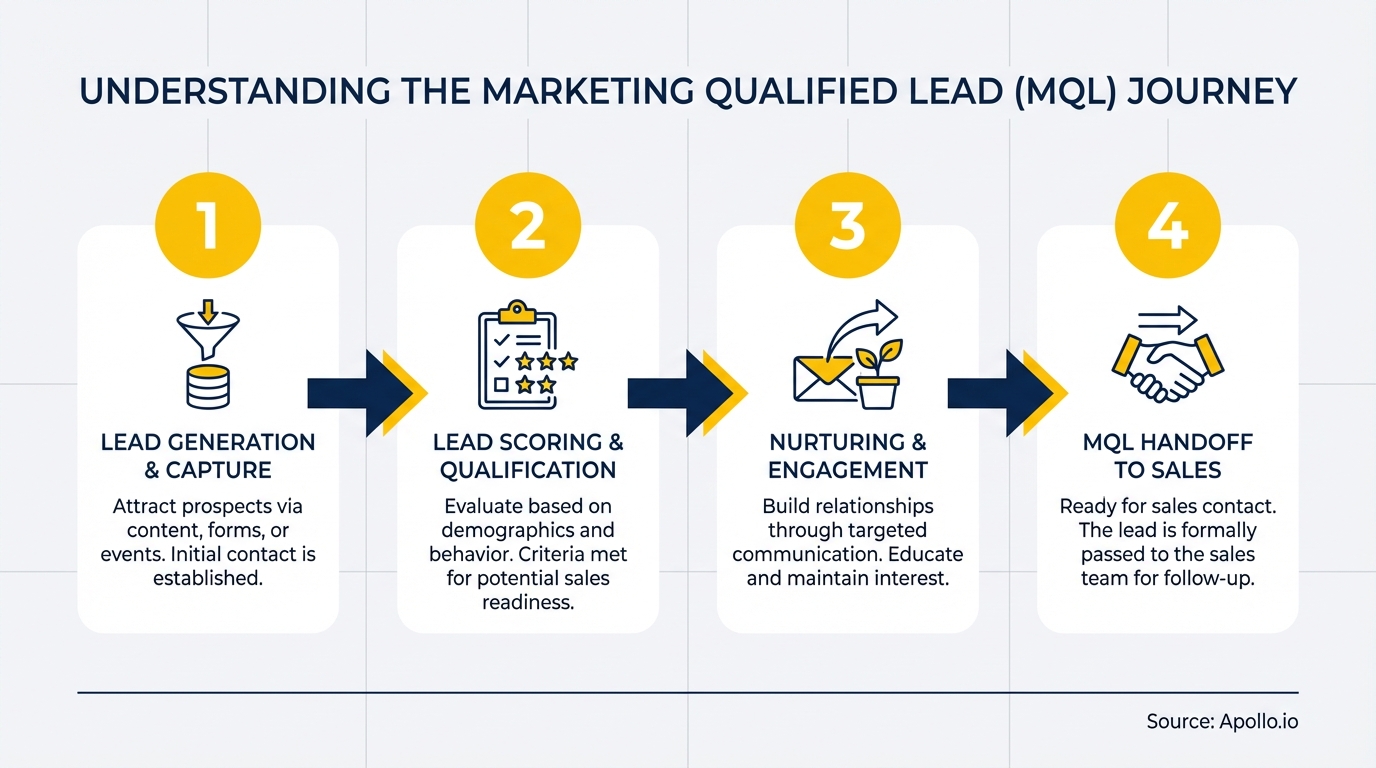What Is an MQL and Why Is the MQL→SQL Handoff Your Real Growth Lever?

What Is an MQL and Why Is the MQL→SQL Handoff Your Real Growth Lever?
If your marketing team is celebrating MQL volume while your sales team complains about lead quality, you're measuring the wrong thing. A Marketing Qualified Lead (MQL) is a prospect who has shown enough interest to warrant sales attention, but here's the uncomfortable truth: according to a HubSpot analysis, the average MQL to SQL conversion rate across all industries is approximately 13%. That means 87% of your "qualified" leads never become sales opportunities.
The B2B buying landscape shifted dramatically in 2025. Modern buyers want rep-free research journeys, buying committees create internal conflict, and irrelevant outreach actively disqualifies otherwise viable prospects.
The companies winning pipeline in 2026 aren't generating more MQLs. They're engineering better handoffs, building consensus assets, and redefining what "qualified" actually means.

Find Verified Contacts In Seconds With Apollo
Tired of spending 4+ hours daily hunting for contact info? Apollo delivers 224M+ verified contacts with 96% email accuracy. Join 550K+ companies closing more deals.
Start Free with Apollo →Key Takeaways
- An MQL is a lead that meets specific engagement and demographic criteria, but MQL→SQL conversion is the metric that actually predicts revenue
- Research shows the overall MQL-to-SQL conversion across B2B sectors averages between 12-21%, with a median of approximately 15%
- Modern buyers (61% prefer rep-free experiences) require self-serve content journeys with intent-based branching
- Buying-group qualification (identifying multiple stakeholders) outperforms single-lead scoring in committee deals
- Action-oriented assets (ROI calculators, technical validation sheets, procurement packs) accelerate SQL conversion more than nurture emails
What Defines an MQL in 2026?
An MQL is a prospect who has demonstrated interest through specific behaviors (downloading content, attending webinars, visiting pricing pages) and meets your ideal customer profile criteria. The traditional definition focused on scoring points for actions.
The modern definition requires evidence of buying intent across multiple stakeholders.
Here's what separates an MQL from other lead types:
| Lead Stage | Definition | Key Indicator |
|---|---|---|
| Raw Lead | Contact with minimal information | Email address only |
| MQL | Engaged prospect matching ICP | Content engagement + fit criteria |
| SQL | Sales-accepted opportunity | Confirmed need + buying timeline |
| Opportunity | Active deal in pipeline | Budget confirmed + decision process mapped |
The distinction that matters: MQL measures marketing's filtering effectiveness; SQL measures sales' acceptance rate. If your MQL→SQL conversion sits below 15%, you're either scoring the wrong behaviors or missing the buying committee. Learn more about the MQL vs SQL distinction.
"Apollo enriches everything we have: contacts, leads, accounts... And we don't really have to touch it, it just works."
Why Traditional MQL Scoring Fails Modern Buying Committees
The biggest gap in most MQL frameworks: they score individual behavior when B2B purchases require committee consensus. A single champion downloading your ROI calculator doesn't mean procurement, IT security, and the CFO are aligned.
High-performing teams now track:
- Account-level engagement: Multiple stakeholders from the same company consuming content
- Role diversity signals: Technical evaluator + economic buyer + executive sponsor activity
- Intent depth: Progression from awareness content to evaluation assets to procurement resources
- Velocity indicators: Time between first touch and demo request (faster = stronger intent)
Need better lead intelligence? Apollo automatically enriches contacts with firmographic data, job changes, and buying signals so you can identify buying committees, not just individual leads.
The Rep-Free MQL Journey Your Buyers Actually Want
Modern B2B buyers want to self-qualify before talking to sales. Your MQL engine should support that journey with intent-based content branching:
For Early-Stage Researchers (Problem Awareness):
- Educational content: industry benchmarks, problem frameworks, diagnostic tools
- No sales follow-up yet (let them progress naturally)
- Track progression to solution-focused content
For Active Evaluators (Solution Exploration):
- Comparison guides, ROI calculators, implementation timelines
- Buying committee assets (security questionnaires, technical specs, procurement templates)
- Light-touch SDR outreach: "Need help with your evaluation?"
For Purchase-Ready Buyers (Vendor Selection):
- Pricing transparency, contract templates, onboarding previews
- Immediate sales routing (these are your highest-converting MQLs)
- Executive alignment offers
This branching logic requires tracking behavioral signals across your B2B marketing funnel and routing based on intent stage, not just point totals.

Pre-SQL Content That Accelerates Handoffs
The gap between MQL and SQL isn't always qualification. Often it's missing artifacts that help buyers build internal consensus or validate technical fit. High-converting MQL programs include:
| Asset Type | Purpose | Impact on SQL Conversion |
|---|---|---|
| ROI Calculator | Quantify business case | Moves economic buyer to active evaluation |
| Security Questionnaire | Pre-answer IT concerns | Eliminates deal-killing objections early |
| Implementation Plan | Show timeline/resources | Reduces perceived risk and effort |
| Vendor Evaluation Template | Structure comparison process | Positions you as evaluation leader |
| Procurement-Ready Pack | Contract, legal, compliance docs | Shortens sales cycle by weeks |
These aren't nurture emails. They're self-serve buying enablement that qualifies MQLs faster and reduces SDR/AE time spent on unready prospects.
"We reduced the complexity of three tools into one. We're getting higher reply rates, open rates are doubled, meetings are up, and speed to booking a meeting is cut in half."
Turn Unreliable Forecasts Into Revenue Wins
Missing quota because your pipeline data is never current? Apollo delivers real-time deal visibility with 224M+ verified contacts. Built-In boosted win rates 10% with Apollo's buyer signals.
Start Free with Apollo →How to Fix Your MQL→SQL Conversion Rate
If your conversion rate sits below the 15% benchmark, diagnose the bottleneck:
Low Conversion (Under 10%):
- Problem: Over-inclusive MQL criteria or poor lead routing
- Fix: Tighten scoring thresholds, add firmographic filters, implement lead qualification questions
- Track: Which sources/campaigns produce sub-10% conversion (pause or fix them)
Moderate Conversion (10-20%):
- Problem: Timing or buying-readiness mismatch
- Fix: Add intent signals (pricing page visits, competitor comparison views), track account-level engagement
- Track: Time-to-contact after MQL threshold (speed matters: organizations that respond within one hour achieve 53% conversion rates compared to 17% for responses after 24 hours)
High Conversion (20%+):
- Problem: You might be under-routing (sending only slam-dunks to sales)
- Fix: Test slightly looser criteria to increase volume without tanking quality
- Track: Opportunity→Close rates (ensure you're not cherry-picking)
Explore B2B marketing metrics that actually correlate with revenue, not just lead volume.

Measuring What Actually Matters: MQL Performance Metrics
Stop reporting MQL volume to leadership. Start reporting these:
| Metric | Why It Matters | Benchmark |
|---|---|---|
| MQL→SQL Conversion | Shows qualification accuracy | 15% median (B2B) |
| Cost per SQL | True cost of sales-ready lead | Industry-specific |
| SQL→Opportunity Rate | Validates sales acceptance quality | 30-50% |
| Time to SQL | Speed of qualification process | Under 48 hours |
| MQL→Closed-Won Rate | End-to-end marketing effectiveness | 2-5% |
Struggling to track pipeline from first touch to close? Apollo's unified platform tracks every interaction from prospecting through closed deals so you can see which campaigns actually drive revenue.
Technology Requirements for Modern MQL Management
Your MQL infrastructure needs:
- Marketing automation for scoring, nurture, and routing
- Sales intelligence platform for enrichment and intent signals
- CRM integration for handoff tracking and feedback loops
- Revenue attribution for source-to-revenue visibility
- Conversation intelligence to understand why MQLs convert (or don't)
The best-performing teams consolidate these capabilities into fewer tools. Multiple disconnected systems create handoff gaps and attribution blind spots. Learn about CRM integration strategies that actually work.
Start Optimizing Your MQL Engine Today
The path to better pipeline isn't generating more MQLs. It's converting more of the MQLs you already have. Here's your 30-day action plan:
Week 1: Audit Current State
- Calculate your MQL→SQL conversion rate by source/campaign
- Interview sales: why do they reject MQLs?
- Map your current scoring model and identify behavior gaps
Week 2: Build Consensus Assets
- Create one ROI calculator or comparison template
- Develop a security/compliance FAQ document
- Build an implementation timeline resource
Week 3: Implement Intent Signals
Week 4: Optimize Handoff Process
- Define clear MQL→SQL acceptance criteria with sales
- Implement speed-to-lead alerts (under 1 hour response)
- Create feedback loop: why did sales reject this MQL?
The companies that win in 2026 won't have the most MQLs. They'll have the best MQL→SQL conversion rates because they built systems that help buyers qualify themselves and make internal consensus easier.
Ready to transform how you generate and qualify leads? Start free with Apollo and access verified contact data, automated enrichment, and engagement tracking in one unified platform.
Prove Apollo's Value In Your First Week
Budget approval stuck on unclear metrics? Apollo tracks every touchpoint from prospect to closed deal. Customer. io achieved 50% YoY growth with measurable pipeline impact.
Start Free with Apollo →
Andy McCotter-Bicknell
AI, Product Marketing | Apollo.io Insights
Andy leads Product Marketing for Apollo AI and created Healthy Competition, a newsletter and community for Competitive Intel practitioners. Before Apollo, he built Competitive Intel programs at ClickUp and ZoomInfo during their hypergrowth phases. These days he's focused on cutting through AI hype to find real differentiation, GTM strategy that actually connects to customer needs, and building community for product marketers to connect and share what's on their mind
Don't miss these
Sales
Inbound vs Outbound Marketing: Which Strategy Wins?
Sales
What Is a Sales Funnel? The Non-Linear Revenue Framework for 2026
Sales
What Is a Go-to-Market Strategy? The Data-Driven Blueprint That Actually Works
See Apollo in action
We'd love to show how Apollo can help you sell better.
By submitting this form, you will receive information, tips, and promotions from Apollo. To learn more, see our Privacy Statement.
4.7/5 based on 9,015 reviews
